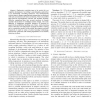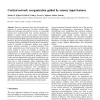6 search results - page 1 / 2 » An intrinsic reward mechanism for efficient exploration |
ICML
2006
IEEE
14 years 5 months ago
2006
IEEE
How should a reinforcement learning agent act if its sole purpose is to efficiently learn an optimal policy for later use? In other words, how should it explore, to be able to exp...
IJCNN
2008
IEEE
13 years 10 months ago
2008
IEEE
— Exploratory activities seem to be crucial for our cognitive development. According to psychologists, exploration is an intrinsically rewarding behaviour. The developmental robo...
BC
2002
13 years 4 months ago
2002
Abstract. Sensory experience alters the functional organization of cortical networks. Previous studies using behavioral training motivated by aversive or rewarding stimuli have dem...
IJCAI
2001
13 years 5 months ago
2001
R-max is a very simple model-based reinforcement learning algorithm which can attain near-optimal average reward in polynomial time. In R-max, the agent always maintains a complet...
JSA
2010
12 years 11 months ago
2010
During the past few years, embedded digital systems have been requested to provide a huge amount of processing power and functionality. A very likely foreseeable step to pursue th...


